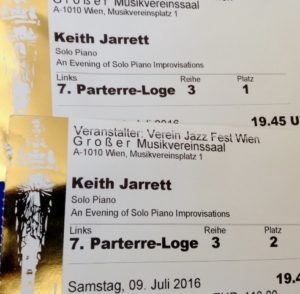KEITH JARRETT: A MUSICAL GENIUS IN DESPERATE NEED OF A SNICKERS BAR

He walked onto stage and the applause swelled. I had never seen the Golden Hall of the Vienna Musikverein so jam-packed full of people. Every single one of the 1744 seats and 300 standing places was filled with the face of an adoring fan anxiously awaiting the warm greetings of a Musical Meister.
What we got was the ranting, reprimanding threat of a diva: “I will not play a single note until the two people who just took a photo leave this concert hall. If you’re sitting beside them, urge them to leave or I won’t play.” Like a toddler mid-tantrum, he stomped off the stage and the lights went back up.
A disturbed chatter arose from the crowd. The Viennese consensus? He’s nuts. And they weren’t referring to the photo-taker caper(s). Just enough time ticked by for us to begin to wonder what the Musikverein’s refund policy is on our not-too-cheap tickets when the artist throws a fit and refuses to perform. In the nick of time, a gentleman (hero?) in a dark t-shirt rose from the center of the audience, about 25 rows deep, from a section where tickets no doubt cost upwards of 120 € each, stood up, bumped his way past the stunned fellow concert-goers in his row and exited the auditorium with a shake of his head. Many of us harbored serious doubts whether the departed was the culprit but the ritual sacrifice being made, the self-chosen martyr offered up, the show could go on.
A man in a suit who we recognized from before Cellphone Gate as the gentleman who informed us that there’d be a live recording and we must refrain from extraneous noises reappeared on stage. In a more apologetic than admonishing tone, he reminded us of the “Künstler’s” need to concentrate. Finally Mr. Jarrett re-entered and I no longer know if anyone clapped at this point. Here and there I believe but the unbridled enthusiasm of his initial entrance was history. Why? Three reasons. First, stunned people can’t clap, they’re too shocked to move their hands (see photo of my stunned face included herein). Second, who could tell what might set him off again – perhaps clapping out of rhythm, for example. Third, we all just wanted to put the embarrassing moment behind us as quickly as possible and move on with things.
Mr. Jarrett sat before his grand piano and pounded the keys as if they too were personally involved in the photo-taking infraction. Disjointed chords of choppy scales torpedoed into the loges left and right. Irritated notes wrestled in an angry sea of quick, successive sounds.
He was angry. The music was angry. And I was angry.
But by the third piece, then there was light. Staccatos grew more and more interspersed with light, playful notes. By the fourth piece, I could bring myself to join the others and clap, now convinced that it would have been a grave mistake to march out of the hall with Mr. T-Shirt Man in a show of solidarity and a refusal to accept such treatment of us non-genius, musical-lover mortals (as a firm believer in the age-old advice: you are responsible for how you let others treat you). But the lesson was obvious: Keith Jarrett could clearly get away with mistreating his audience members because he truly is a musical genius. The epiphany made me sad for artists specifically and humankind in general.
For years Keith Jarrett’s Cologne Concert, Paris Concert and Vienna Concert from his 1991 appearance in the Vienna Opera House have been some of my most beloved, trusted accompaniments while writing. Sit down, crank it up and within 5 minutes you are in the “mood” and the words stream across the page like currents in a waterfall.
He isn’t hitting pre-prescribed notes. This is improvisation. He is sitting at his bench and coaxing the keys to come together in just the right manner to take his listeners on a magical journey of his making. His music elevates all present to a higher, better, otherworldly place.
By the end of his concert I enthusiastically joined the standing ovation. Not just one but three – or was it four? — encores. His final piece, a playful, soulful version of “Somewhere Over the Rainbow” seemed like the artist’s version of an apology of sorts. It was that moving. Then he said, “Thank you,” but couldn’t leave us for the night with happy, fuzzy feelings to accompany us home. No. He just had to add, “Now aren’t you glad you were strong? Aren’t you glad you were smart?”
To quote Homer Simpson: “D’Oh!” [slaps hand to forehead].
The concert was recorded live. Mr. Jarrett’s hyper-sensitive (compulsive?) tendencies made me wonder why he does live recordings. Wouldn’t a studio recording be easier to control all variables possible when you pack 2000 people in a room? It’s a contradiction, I suppose. The man who demands such utmost control and obedience of an audience of thousands chooses live recordings and improvisation.
At the same time, after intermission, it wasn’t an apology, don’t get me wrong, but perhaps a justification. Kind of. Mr. Jarrett said that all the picture-taking makes him feel like a caged animal. He also added: “People who think they can interfere with processes is what’s f—ed up the world today.” I get that. But what’s really f—ed up the world is a general lack of empathy. And when thousands of people from all over the world, all walks of life who could be mid-living all the tragedies and challenges life can throw at you, re-arrange their day-to-day existence, coordinate and pretty themselves up to join together at a certain time and place to spend precious, never-to-be-re-gained hours of their life, just to hear you play your music, to join you on a journey to a higher place blindly following nothing more than the next musical note – that is something rather extraordinary and the opposite of f—ed up. And if you give that a bitter after-taste (or before- and after-taste), then shame on you.
There is a synergy between an audience and artist that no studio can give. A synergy in a Golden Hall that has been home to such beauty and artistry of some of history’s and the world’s best talents for over 140 years. A synergy that lingers beyond the 2 seconds the notes are held suspended, a synergy that transcends space and time and I think you must know that, Mr. Jarrett, which is why you record live. So chill. You’re playing jazz, the chillest tunes of them all. Appreciate the joining together to experience a precious parenthesis in time.
I’d like to end with a bit of advice for future concerts:
* to potential Keith Jarrett concert-goers: go, the music will be amazing, but for God’s (Keith Jarrett’s and the concert’s) sakes, keep that trigger finger off the camera icon.
* to Mr. Jarrett: get a grip, chill and have some empathy. If the audience peeves you off, do like Bob Dylan did when he gave a concert in Burg Clam – don’t acknowledge the audience at all. Not one word. Not “Hello” “How are you” or “Thanks.” If they’re like me, sure, they’ll feel snubbed but better snubbed than down-right insulted.
* to concert organizers, you saints, you:
- if tales from a Berlin concert are to be believed, be sure to have the piano tuned before the concert;
- hang up plenty of signs politely advising that the diva “artist” requires utmost concentration and concert-goers who cannot refrain from taking photos kindly will be asked to leave
- give that musical genius a Snickers bar. Or two. Or three. (supposedly they’re good at humanizing divas). And who knows? Maybe there’s a commercial spot in his future and you can turn lemons into lemonade.
Anger advice: It’s better to distract than vent because getting it out can intensify the emotion. Go figure.
I love the podcast the Hidden Brain and this is a fascinating take on what makes Keith Jarrett’s Cologne Concert so phenomenal (though I doubt Keith would agree):
NPR Podcast, Hidden Brain: In Praise of Mess: Why Disorder May Be Good For Us




